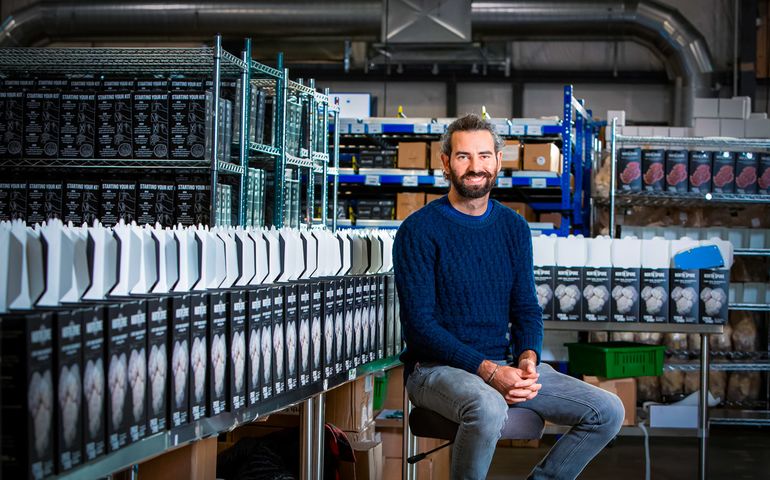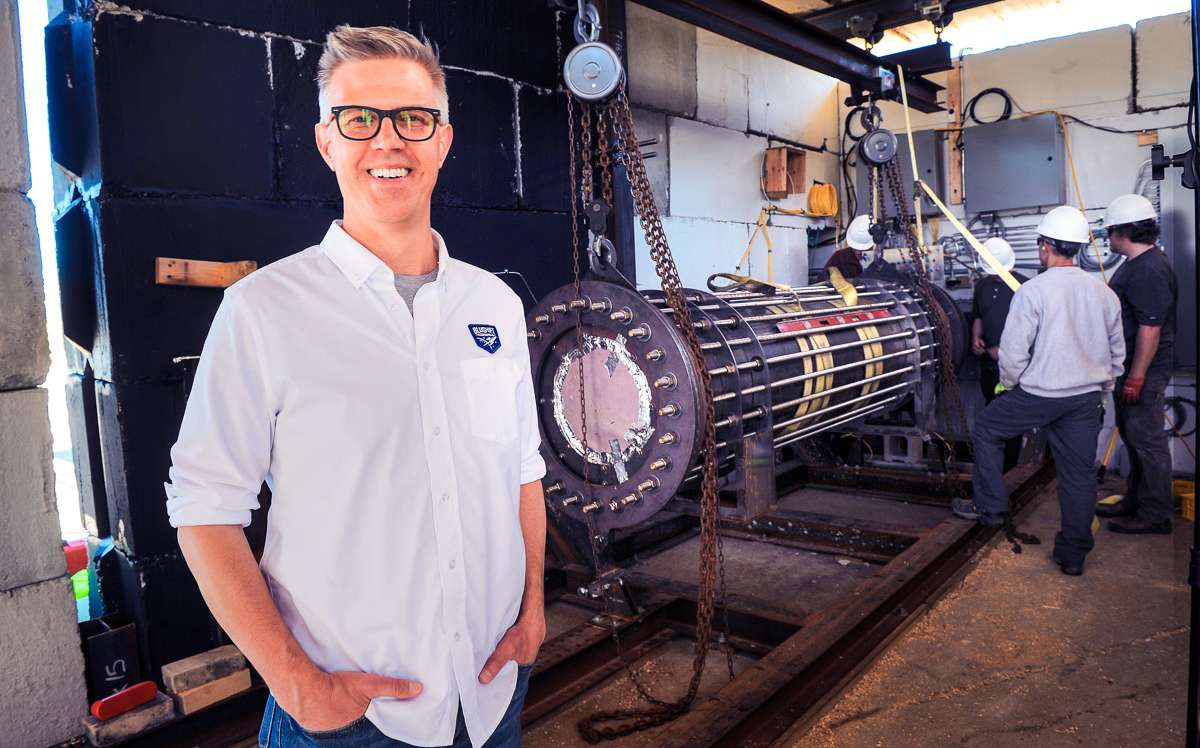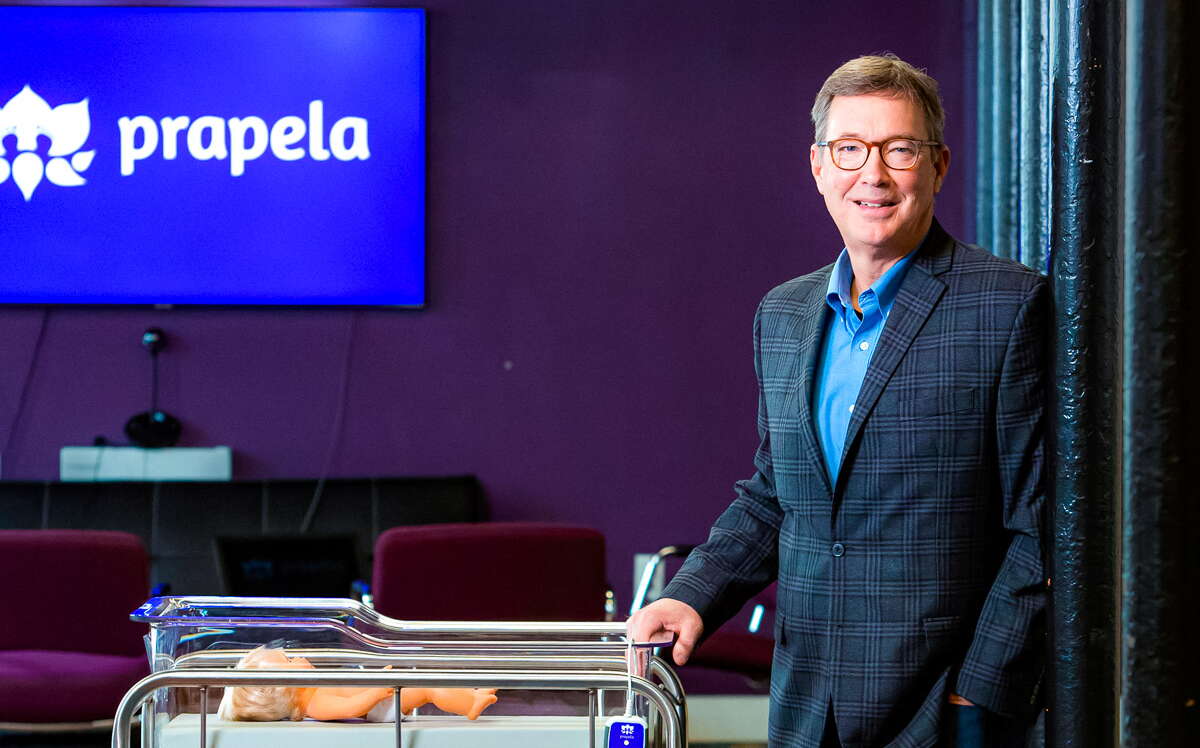
Money talks: From pitch contests to grants, how some Maine startups are becoming fundraising stars
 Photo / Tim Greenway
Eliah Thanhauser, co-founder and CEO of North Spore, is a Maine business pitch-contest veteran, winning $150,000 in two back-to-back victories in 2018.
Photo / Tim Greenway
Eliah Thanhauser, co-founder and CEO of North Spore, is a Maine business pitch-contest veteran, winning $150,000 in two back-to-back victories in 2018.
More Information
Winning $150,000 in back-to-back pitch competitions was a big coup for a little startup that set out to “make the world of mushroom cultivation accessible for all.”
North Spore, which produces and sells mushroom cultivation supplies and medicinal products, was just four years old in June 2018, when co-founder and CEO Eliah Thanhauser won $50,000 in the Gorham Savings Bank LaunchPad contest and $100,000 on “Greenlight Maine,” a televised series currently in its eighth season.
“That was a huge jump forward,” Thanhauser says. “It was exhilarating, too — and amazing to win both. That was by far the most amount of money that had come into the business at once, and that helped really push us forward.” The following year, Thanhauser powered through a Fair Food Network Business Boot Camp pitch competition with a hoarse voice that was “so soft and distracting that no one could hear me,” and lost.
Such is the roller-coaster ride of business-pitch contests with a growing number of options, including a “Greenlight Maine College Edition” and “Elevating Voices” spinoff to showcase diversity. This year’s newcomers include Main Street Skowhegan’s Business Lab Competition, which debuted in November, and Dirigo Labs in Waterville, an accelerator program that crowned its first pitch winner in June.
Win or lose, all participants get practice time in the competitive fundraising arena — a spring training of sorts for the major leagues.
“Business-pitch contests are gateways to networks,” says Katie Shorey, president of Startup Maine, a Portland-based, volunteer-run nonprofit. “It’s a critical part of the startup ecosystem … People need practice pitching, so the more we can have them [contests], the more money can get infused. It’s good for entrepreneurs.”
Along similar lines, “Greenlight Maine” producer and host Julene Gervais says that the team views all contestants as winners and promotes them on social media.
“We help the contestants produce a pitch they can use over and over again to gain potential business through various investment and promotional opportunities,” she says.
While pitch contests are not for everyone, they offer an entry point for aspiring entrepreneurs in a state that ranked in the lower half (No. 38) on a recent Forbes list of where to start a business in 2022. Some Maine startups are racking up pitch-off wins before going on to other fundraising, while others prefer more specialized accelerator programs and grants.
NKENNE’s winning streak
NKENNE is an African-language learning app founded by Michael Odokara-Okigbo, an entrepreneur of Nigerian descent who splits his time between Maine and New York City. The idea for the business grew out of his interest in learning Igbo (pronounced EE-boh), the principal language of the Igbo people, an ethnic group from southeastern Nigeria.
“I was wanting to learn the traditional language of the tribe I come from and there was no easy way to learn it,” Odokara-Okigbo tells Mainebiz via Zoom from Nigeria. He launched ESM Global Consulting in Portland in 2017 before adding language learning with NKENNE.

“It was during the pandemic and I had been learning French, but there was no easy way to learn the Igbo language,” he explains. While ESM is still active in IT and security consulting, NKENNE is the company’s main project — backed by more than $150,000 from business-pitch victories and grant funding.
“We’ve been able to survive and move forward by the pitch competition and grants,” the 32-year-old says. “We’ve been in the finals of over 15 pitch competitions over the past 18 months, and that has made a ton of people proud of us to see where we land.”
NKENNE’s contest victories include the Capital One Catapult program, an annual program to help diverse business owners develop a solution to a critical business challenge, and the Dartmouth (College) Entrepreneur Forum Pitch at Odokara-Okigbo’s alma mater. In Maine, NKENNE was a finalist in both “Greenlight Maine” and the Big Gig Pitch-Off. As this year’s emerging-business award winner in the Gorham Savings Bank LaunchPad contest, NKENNE won a $10,000 grant plus $10,000 of in-kind business and marketing-related services.
The subscription-based app was launched on Nov. 11, the same day as the release of Marvel Studios’ superhero sequel “Black Panther: Wakanda Forever.”
The release follows nine months of beta testing on the web-based platform, which is up to 100,000 users worldwide. Users, who are mostly female, include college students wanting to learn more about their African roots as well as high schoolers applying to college.
Outside his business ventures, Odokara-Okigbo is a singer, songwriter, performer, actor and producer — with a stage name of Michal O. — who has performed at the Lincoln Center, the White House and sung the National Anthem at various venues. He describes his music as a mixture of R&B and Afro-beats and likens business-pitch contests to musical performances.
His long-term goal is to secure funding from angel and other types of investors for NKENNE.
bluShift blasts off
In Brunswick, bluShift Aerospace is a rising rocket startup that has tapped multiple funding sources. Pitch-contest victories include a $5,000 third-place finish in “Greenlight Maine” in 2021, and first place in Dirigo Labs’ inaugural pitch contest this past June, beating 11 rivals.
Besides taking home $25,000 in prize money and winning the Audience Choice Award in the Waterville contest, bluShift received a one-year dedicated desk membership to Bricks Coworking and Innovation Space in Waterville. The contest followed a 12-week accelerator program that paired participants with mentors.
Sascha Deri, bluShift’s founder and CEO, said that while he was at first hesitant about participating because of the time commitment, he is now glad that he did.
“I went from doubting its usefulness to ‘Oh wow, this is incredible, this is really helpful,’” he says. Through the 60-member mentor network, he says, bluShift was able to connect with people “with specific knowledge of our pain points to give us advice. It was spot on.”
The company has tapped into other funding sources from crowdfunding site Wefunder to grants and loans from the Maine Technology Institute; it’s also raised money through a platform called Slicing Pie, which lets people invest their time and/or money for future equity in early-stage startups. For Deri, the next step is to find more traditional investors outside Maine.
One important lesson he learned from “Greenlight Maine” is to always speak from the heart. His advice to fellow entrepreneurs: “Never memorize what you’re going to say. It doesn’t come across as authentic, whereas doing it in your natural talking voice is much easier.”

HighByte’s LaunchPad lessons
For some startups like HighByte, one business pitch contest — and victory — is enough. The Portland-based industrial software provider won the $50,000 Gorham Savings LaunchPad prize in 2021, after Torey Penrod-Cambra’s closing argument about winning the “tech talent war.”
The company, which used the prize money to invest in recruitment, is now at 22 employees working in areas including research and development, marketing, sales and operations.
Penrod-Cambra, HighByte’s co-founder and chief marketing officer, says the money wasn’t the only draw for participating.
“I was also excited by the idea of sharing our story and the recognition that would come with that if we could make it to the live pitch,” she says. She says she prepared by reading and watching the judges’ guidance, and then applying that advice to her own pitch, focusing on innovation and how HighByte would use the funds if it won.
“I knew it would be a challenge to communicate a highly technical product in a way that humanized it and make it come to life,” she recalls. “That took dozens of practice runs in front of my colleagues, friends and family to refine the pitch.”

That practice paid off at the June 2, 2021, contest finale. HighByte was up against Erin Flett of Studio e Flett, of Gorham; Hüga Heat, maker of battery-powered seat cushions; and Vintage Maine Kitchen, a Freeport-based small-batch potato-chip maker and returning finalist from 2019. While Studio e Flett was voted the audience favorite, HighByte won over the three-judge panel. During her pitch, Penrod-Cambra said her company would use its winnings to pay new hires well and “stop losing tech talent to Boston and New York.”
Including the LaunchPad prize, HighByte has raised $4.95 million to date, with the rest coming from grants, angel investors and venture capital from within and outside of Maine.
“The pitch also forced us to tell our story more concisely,” Penrod-Cambra says. “Summarizing the problem you solve, how you’re uniquely able to solve it, and what you need from an investor in 60 seconds is so hard and so important in a noisy world.”
While she encourages entrepreneurs interested in pitch contests to be persistent, even if they have not been accepted in the past, she also offers some words of caution.
“Whenever a founder or entrepreneur is raising money — whether that’s grant applications, pitch contests or venture funding rounds — they are taking their eye off operations and customer growth,” she says. “It’s a balance. Raising money is important, but I think it’s important to be selective about how we spend our time. My advice is to make sure the pitch contest aligns with your values, business goals and timeline.”
Prapela’s measured approach
Pitch competitions aren’t for everyone and certainly not for Prapela, a Biddeford-based medical technology startup that has pioneered a technology-enabled bassinet pad to help newborn babies breat he, sleep and relax.
The patented pad, manufactured by South Portland-based Saunders Electronics, is currently under review by the US. Food and Drug Administration for use in hospitals treating opioid-exposed newborns.
The three-person company, led by CEO and principal founder John Konsin, recently won first place in a national pediatric innovation competition in the form of a $50,000 grant from the U.S. Food and Drug Administration. Judges recognized Prapela’s incubator pad as the first innovation in over 20 years to improve the treatment of apnea in premature babies.
The award, announced Oct. 24 by the National Capital Consortium for Pediatric Device Innovation, brings Prapela’s total to $4.64 million raised in grants and awards since 2017.
The award was the culmination of Prapela’s participation — a first for a Maine company in the Medtech Innovator Accelerator program, the largest of its kind in the world. The contest was judged by clinicians, investors and MedTech company executives,
“I never looked at raising funds as the goal of my startup,” Konsin says. “Unfortunately, I think that’s where a lot of CEOs are focused. Instead, I focused on what is the clear-cut value that our technology or device brings to patients … If you focus on satisfying the unmet need, then whether you’re pursuing a grant or an equity raise, the money will take care of itself.”

He said the company plans to use the $50,000 towards meeting the FDA’s independent testing requirements for approval of the device. Konsin says that while it’s hard to put a number on the cost of FDA approval, the range tends to fall between $500,000 and $2 million for a medical device.
The FDA is currently reviewing Prapela’s device for marketing clearance, which could come as early as the first half of 2023.
Konsin says Prapela has chosen to go after grants rather than taking on bank debt or pursuing equity, venture capital or angel investors.
“I decided early on I’d much rather spend my time competing to get the grants than taking on multiple investors and answering their questions,” Konsin says. “Instead of dealing with multiple people every month or every quarter, I’m dealing with updating the NIH [National Institutes of Health] or whoever we receive competitive grants from on our progress.”
The other reason for the strategy: “The most expensive money for an entrepreneur to take in is the earliest money,” he says. “As a company is able to prove itself and reach milestones, the less money it needs but also the less value a company has to give up. It’s unfortunate that so many companies don’t look at the opportunity that’s available not just through the NIH, but almost every branch of government.” Prapela’s funding sources include the federal Small Business Innovation Research and Small Business Technology Transfer programs, which are often collectively referred to as America’s seed fund. Prapela was also a finalist in the 2021 LaunchPad emerging business category.
Back at North Spore in Portland, Thanhauser jokes about pitch contests as a distant memory, saying that “my nightmares keep evolving.” A musician who plays guitar and mandolin and writes indie folk country songs, he likens pitch-offs to performing a song, and encourages budding entrepreneurs to take a stab even without a formal business background.
The former organic farmer has the track record to prove that’s possible - he teamed up with two college friends to start a mushroom business that today has close to 60 employees and looks to its next fundraising chapter. “We are now ready to take on equity investors,” he says.














0 Comments